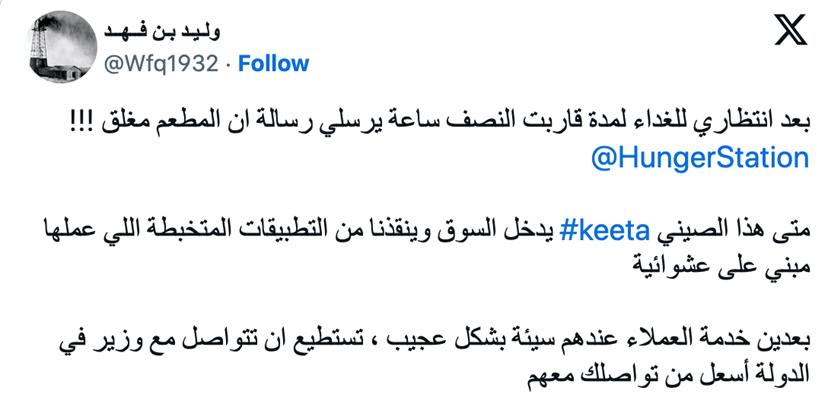Meituan's 100 Days in the Middle East: Another Rapid Expansion
![]() 12/20 2024
12/20 2024
![]() 723
723

It has been 100 days since Meituan Waimai entered the Middle East.
On September 9, 2024, Meituan officially announced the launch of its overseas food delivery platform "Keeta" in Al-Kharj, Saudi Arabia. Following a month-long pilot, Keeta began to expand rapidly.
Currently, Keeta has expanded to the capital Riyadh. According to reports, its expansion is accelerating and is projected to cover 80% of Saudi Arabia by July 2025, with plans to expand into other Middle Eastern countries and North Africa next year.
Meituan's expansion speed in the Middle East rivals its domestic growth a decade ago. With the domestic food delivery market nearing saturation, Meituan aims to improve operational efficiency through refined strategies and replicate its domestic success in the Middle East, swiftly capturing a larger market share.
During the third-quarter earnings call, Meituan's management stated that Keeta is in its nascent stages, and Meituan's long-term goal is to become a global company.
I. Bringing the "Rapid Expansion" Strategy to the Middle East
Carefully considering small-scale pilot projects and decisive investments has proven successful for Meituan time and again.
Meituan chose Al-Kharj, a city in central Saudi Arabia, over Riyadh. Saudi netizens highlighted the key reason: competition in Al-Kharj is less intense than in Riyadh. This smaller city, located 40 minutes away by car, boasts demand and good infrastructure, with less congested traffic and lower job turnover, thereby reducing operational costs. Kaiian, a local ride-hailing app in Saudi Arabia, also began in Al-Kharj.
With an area of 19,790 square kilometers, slightly larger than Beijing, Al-Kharj is more accurately translated as Al-Kharj Province. Saudi Arabia is divided into 13 regions, further subdivided into 136 provinces. Riyadh Region is one of these 13, comprising 22 provinces, including Riyadh Province and Al-Kharj Province. Riyadh Province includes the capital city of Riyadh and five other towns, while Al-Kharj Province's capital is Al Saih.
According to the Daily Economic News, Meituan chose Al-Kharj as its initial testing ground.
On October 9, Keeta launched in Riyadh, Saudi Arabia. Foreign media, citing insiders, reported that Keeta plans to enter Dammam and Jeddah by year's end, Mecca and Medina in January next year, aiming to cover 80% of Saudi Arabia by July 2025. Next year, it will also expand into other Middle Eastern countries such as the United Arab Emirates, Bahrain, and Jordan.
Beyond the Middle East, Meituan is also exploring the possibility of expanding into Egypt in North Africa. It had also considered Iraq but recently abandoned the plan due to "political and security issues".
Over the past year, Meituan's strategic principles have also proven successful in the Hong Kong market.
In May 2023, Keeta launched in areas such as Mong Kok and Tai Kok Tsui in Hong Kong, expanding to cover the entire Kowloon district in less than three months, crossing the harbor in September, and encompassing the entire city by October. This rapid expansion took less than five months.
Hong Kong and Saudi Arabia mark Meituan's initial steps towards globalization. During the earnings call in June this year, Wang Xing mentioned that they were evaluating various global markets, with the Middle East, Europe, and Southeast Asia as key focus areas.
As early as May last year, several core Meituan executives, including Wang Xing, Wang Puzhong, and Zhu Wenqian, visited the Middle East multiple times and met with several members of the Saudi royal family and corporate executives. In February this year, Meituan underwent its largest organizational restructuring since its listing, with drone and overseas businesses directly reporting to Wang Xing. By September, when Meituan launched in Al-Kharj, Saudi Arabia, it was a well-thought-out and meticulously planned move.
Wang Xing once stated that Hong Kong serves as an excellent testing ground for their global infrastructure and practical approach. While Hong Kong shares cultural similarities with mainland China, Saudi Arabia offers a distinct cultural experience, potentially marking Meituan's true first step towards internationalization.
II. Meituan's Replication Strategy
Following Keeta's launch in Saudi Arabia, some netizens expressed hope that it would "tidy up the market": "I ordered from HungerStation and was told half an hour later that the restaurant was closed! It's great that Keeta, a Chinese food delivery platform, can enter the market and save us from these chaotic and random apps!"

Upon launch, Keeta immediately began "tidying up" the market, initiating large-scale user subsidies.
Meituan's strategy in Saudi Arabia continues the "burn money for scale" approach used in mainland China. Keeta introduced promotions such as 50% off the first order, free delivery, and compensation for late delivery, aiming to attract users from competitors with substantial discounts.
Tony Qiu, CEO of Keeta, noted that high delivery fees are a primary issue in the Saudi market, leading to user dissatisfaction, while delayed delivery is another common problem.
Addressing the Saudi habit of ordering food for the entire family, Keeta introduced more localized discount packages offering up to 70% off. For orders over 25 Saudi riyals (approximately $6.66), Keeta waives delivery fees and promises delivery within 30 minutes, faster than competitors' usual one-hour delivery time. If delayed, users can receive compensation vouchers ranging from 10 to 50 riyals based on the delay duration.
Delivery fees in Saudi Arabia can reach as high as 20-30 Saudi riyals (approximately RMB 40-60). Some users have complained on social media: "Whenever I'm too lazy to go out for groceries and want to order delivery, I remember the delivery fee, and suddenly I'm not lazy anymore."
Keeta's free delivery can attract many users to place orders. Some users on social media said, "I used to use Hunger Station and Noon, but now that Keeta offers free delivery, I'll definitely consider using it."
Drawing from Meituan's experience in the Hong Kong market, Keeta will initially use money to buy growth. The ultimate goal is not to "eliminate" competitors but to compete on an even footing with major players.
Additionally, Keeta currently faces a shortage of merchant supply.
Despite Keeta's favorable delivery policies, some users have stated they wanted to try Keeta but found their preferred restaurant was unavailable on the platform, opting instead to order spicy hot pot from Wukong Overseas Gokoo, a food delivery platform catering to overseas Chinese diners.
In fact, not only Keeta but other food delivery platforms also grapple with a shortage of merchant supply. The current lack of product options and diversity remains a pain point for Saudi food delivery platforms.
III. The Growing Importance of Efficiency Post-Scaling
In Hong Kong, Keeta swiftly became the largest food delivery platform within less than a year. Measurable AI data shows that in the first quarter of 2024, Keeta's market share in Hong Kong, based on the number of food delivery orders (excluding grocery and pickup services), reached 44%, surpassing Foodpanda's 35% and Deliveroo's 21%.
According to media reports, Keeta plans to invest 1 billion Saudi riyals (approximately RMB 1.93 billion) in marketing expenses in Saudi Arabia, double the amount invested in the Hong Kong market. It is anticipated that Keeta's subsidy policy in Saudi Arabia will rapidly expand its market share, a crucial step in validating Meituan's successful overseas expansion.
On the revenue front, the key to increasing Keeta's food delivery business revenue lies in enhancing online marketing service revenue.
Analysts who have long followed the Saudi food delivery market pointed out that HungerStation currently charges restaurants a commission of 18-25%, while Jahez charges 12-13%. The market expects Keeta's commission to reach at least 10-12% to compete meaningfully with competitors.
When Keeta has a sufficient number of merchants, providing value-added advertising services will be a significant revenue source for Meituan.
On the cost side, delivery fees to riders constitute a substantial cost for Meituan, and improving delivery efficiency is a critical challenge for Keeta.
Drawing from Meituan's domestic experience, refined operations focusing on the delivery system, evolving from delivering food to delivering everything, have been pivotal for Meituan's scalable development by enhancing delivery efficiency.
As Keeta rapidly expands its scale in Saudi Arabia, Meituan's Xiaoxiang Supermarket has also embarked on its overseas expansion, with Saudi Arabia as its inaugural stop. On December 17, media reported that Xiaoxiang Supermarket had landed in Saudi Arabia, with a research and development team of over a hundred people and a business team of several dozen individuals.
Efficient delivery systems are one of Meituan's competitive advantages in China, but whether this will translate in Saudi Arabia remains to be seen over time.
Saudi Arabia's infrastructure differs markedly from that in China. For instance, postal addresses are incomplete, and map accuracy is inferior to China's Gaode and Baidu maps, which cannot pinpoint floors. Even for e-commerce packages, secondary and tertiary deliveries are often required. This inadequate infrastructure poses a challenge for Meituan to improve delivery efficiency in Saudi Arabia.







